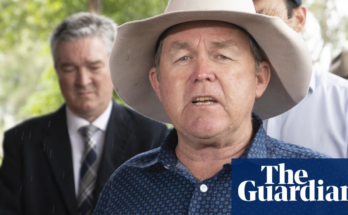From I Wanna Marry “Harry” to Playing It Straight, we’ve long been drawn to deception on reality shows. However, there’s a new breed taking a kinder, gentler approach
Fri 24 Sep 2021 10.00 EDT
In hindsight, it’s not hard to see why ITV launched its doomed winter Love Island series back in 2020. Now that the summer series has finished, reality TV lovers are currently navigating that limbo period in between seasons, scrambling for something to fill the 9pm slot. The race to conquer it is currently between E4’s revamped Married at First Sight (which has gone from being something like a docuseries to rivalling its Australian counterpart in the mess stakes) and ITV2’s Ready to Mingle. The latter slightly edges it for me.
Hosted by the very funny Katherine Ryan, the show follows 24-year-old singleton Sophia as she searches for “The One” among 12 male suitors. However, some of the boys are already taken and being coached by their partners on how to win her affections in order to take home the £50,000 prize money for themselves. It’s brilliant, bingeable viewing, has a diverse cast, and offers a terrifying insight into men’s ability to be economical with the truth (one man swears on his life he doesn’t have a girlfriend – because he has a boyfriend). It’s also the most recent reality TV show to centre around lying and deception, a trend that appears to be making a comeback.
A sting in the tail is always a draw for viewers, and the way these contestants have to sleuth, deduce and suss each other out (or not) often blurs the line between reality TV and gameshow. A surprise breakout hit earlier this year was BBC One’s This Is My House, a programme in which four people claim to be the owner of the same home, with a celebrity panel trying to figure out who is telling the truth. Though it met with criticism online from people who hadn’t actually watched it (host Stacey Dooley had to defend the show on social media from “unnecessarily cruel comments” before it even aired), it has since had rave reviews.
Then there’s I Can See Your Voice, just one of the South Korean game show imports that have taken the UK by storm and are now dominating the Saturday night primetime talent-show spots. Like The Masked Singer and The Masked Dancer before it, I Can See Your Voice is a guessing game; a guest musician and two contestants are presented with a group of six “mystery singers”, some of whom can sing and some of whom cannot. Contestants have to weed out the bad singers from the bunch by guessing who they are without ever hearing them sing a note. It shouldn’t work, but it does.
One of the longest-standing criticisms of Love Island is its commitment to keeping the lame split-or-steal “twist” at the very end of the show. The winning couple are asked to pick an envelope each, one containing £0, the other the grand prize of £50,000. Whoever has the envelope with the prize money is asked whether they were in the game for love or money, with the choice to either split the cash or keep it all for themselves. Of course, no one in the history of the show has ever risked stealing the £50,000, a sum even the runners-up could quite easily double post-show with a few nightclub appearances, sponsored content posts and a fast fashion collaboration. With Ready to Mingle, however, and shows like it, the possibility of double-crossing feels real, and the scheming is naked. Ultimately we don’t feel as though we’re being mugged off if we know the contestants are, too.
Ready to Mingle is a direct descendant of a show with one of the most problematic premises of all time, Playing It Straight, the US/UK series which saw female contestants discern who was gay and who was straight out of a group of men through individual dates and group activities. If the man who was chosen was straight, they would split the prize money. If not, he would receive all the money and the woman would receive nothing. In 2003’s Joe Millionaire, the contestants were told that the central bachelor, Evan Marriott, was a wealthy heir when he was actually a construction worker. In For Love or Money, winners had to choose between starting a relationship with the bachelor or bachelorette, or taking home a cash prize and cutting off all further contact with them.
All bonkers, but none come close to the underrated, ill-fated show I Wanna Marry “Harry”, which was pulled from the air and cancelled after only four episodes, and which saw producers convince contestants that 23-year-old Matthew Hicks was the Duke of Sussex. Considering their similarities began and ended at them both being ginger, English and male, the programme-makers were forced to take the deception up a notch; the show’s winner, Kimberly Birch, explained the lengths they went to trick them in a 2015 interview. “They actually had a therapist come on set at one point and talk to a few of us who were saying it wasn’t him,” she said. “We found out later that it wasn’t a real, licensed therapist.”
Ready to Mingle has a slightly more modern, ethical approach for the millennial viewer – if this had been 2006, Sophia wouldn’t have even known about the twist until the very last episode. Gaslighting and manipulation are generally a no-no but they do feel less sinister when everyone involved knows the aim of the game. However, as this subgenre continues to grow, I’m personally hoping to see one particular series make it back to screens: Space Cadets, in which participants thought they were headed into orbit, but never left Ipswich.
• This article was amended on 25 September 2021. An earlier version incorrectly referred to Prince Harry as “the Prince of Wales” in the text and image caption.
{{topLeft}}
{{bottomLeft}}
{{topRight}}
{{bottomRight}}
{{/ticker}}
{{heading}}
{{#paragraphs}}
{{.}}
{{/paragraphs}}{{highlightedText}}



